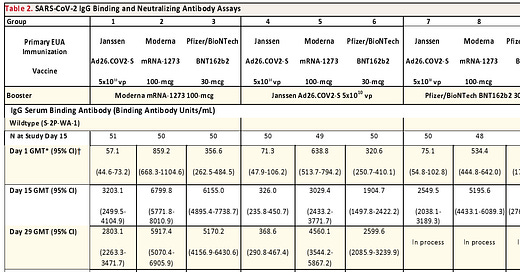In anticipation of this week’s ACIP meeting on Thursday (that’s the CDC group to review after the FDA’s meeting last week), there’s lots of chatter about mix-and-match for vaccine boosters. Many of you know that I received J&J’s vaccine last spring - so, I’m watching this data closely. FINALLY we have some data on mix-and-match for boosters. Let me show you. All the data below is from this study:
To orient you to Table 2 below, you’ll notice that there are 9 groups in this study. Group 1 received J&J first and then boosted with Moderna. Group 2 received Moderna first (both vaccines) and then boosted with a third dose of Moderna. Group 6 received Pfizer first (both vaccines) and then boosted with J&J. And on and on. They then looked at 2 main outcomes which are two ways to measure how our immune systems respond to vaccines. Both outcomes give us protection - so, both are important:
IgG serum antibody levels at 15 days and 29 days post-booster.
Neutralizing antibody levels
Let’s talk about IgG serum antibody levels first
If you received J&J first, look at groups 1, 4, and 7.
The BIGGEST benefit among all 9 groups was among those who initially received J&J and then were boosted with mRNA vaccine of Moderna or Pfizer. Compare group 1 (J&J first and then boosted with Moderna) to group 4 (J&J first and then boosted with J&J). At day 29, the antibody levels were 2803.1 versus 368.8. Whoa.
If you received Moderna vaccines (both doses), look at groups 2, 5, and 8. Receiving another 3rd dose of Moderna had the highest levels at day 29.
If you received Pfizer vaccines (both doses), look at groups 3, 6, and 9. Receiving a booster of Moderna/Pfizer resulted in the highest levels compared with a J&J booster.
Now let’s look at neutralizing antibodies.
This figure shows the same data we just looked at it but in picture-form. Panels A, B, and C show the data we just discussed.
Now let’s look at Panels D, E, and F for the data on neutralizing antibodies after a booster. We see the same story again. The biggest benefit of a booster was among persons who initially received J&J. BUT ALL groups benefited from a booster too at day 15 and day 29.
What about side effects?
Side effects were what you would expect and were mild (chills, fever, headache, tired). The side effect profiles didn’t really change all that much depending on what vaccine you initially received and what booster you received.
What now?
We wait to see what will be approved in terms of mix-and-matching for boosters. I anticipate this mix-and-match approach will be approved with some caveats - especially for the J&J group. We will know later this week what is and is not approved.
What am I going to do? This is not medical advice - it’s just my personal decision. I’m getting a mRNA booster. Based on the data I talked about today and other data we’ve seen in the UK with people receiving the AstraZeneca vaccine (which is similar to J&J’s technology) and then those people getting an mRNA vaccine. That data also showed high antibody responses and great safety profiles! These decisions are definitely something to talk with your family doctor since everyone’s medical history is different.
Have a great week! It’s a busy one in the FDA/CDC world of vaccine boosters.
-FNE







Do you have any insight on booster recommendations for those who have had COVID and got vaccinated? I'm a nurse eligible for Pfizer booster & definitely willing to get, but have seen a couple of different articles talking about not needing one and wondered if there's any merit to them. I had antibodies drawn for a study that showed both spike protein and total antibodies elevated, and I'm not sure what to do with that data either lol
Question on the Moderna booster as a J&J recipient... Table 2, group 1 above shows the Moderna booster is 100 mcg. I thought the Moderna booster that was authorized by the CDC was only 1/2 dose, or 50 mcg. How does this impact the findings? Personally, would you go with the Pfizer or Moderna booster?